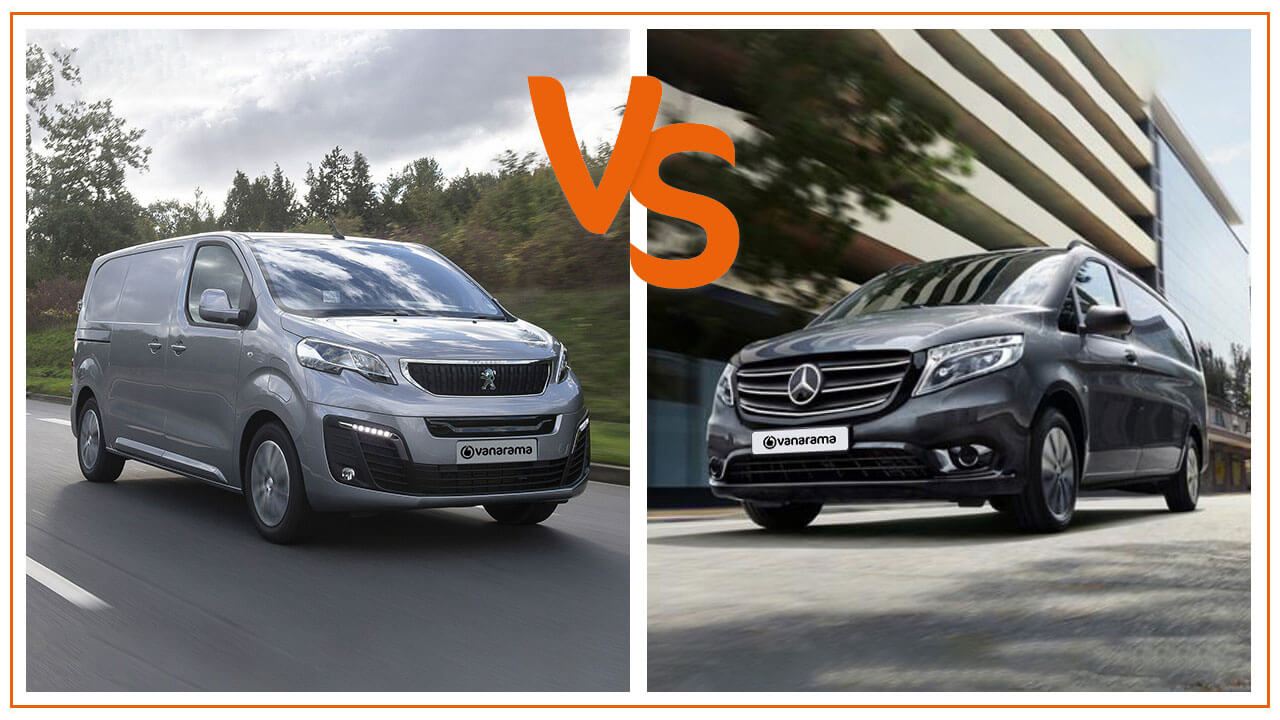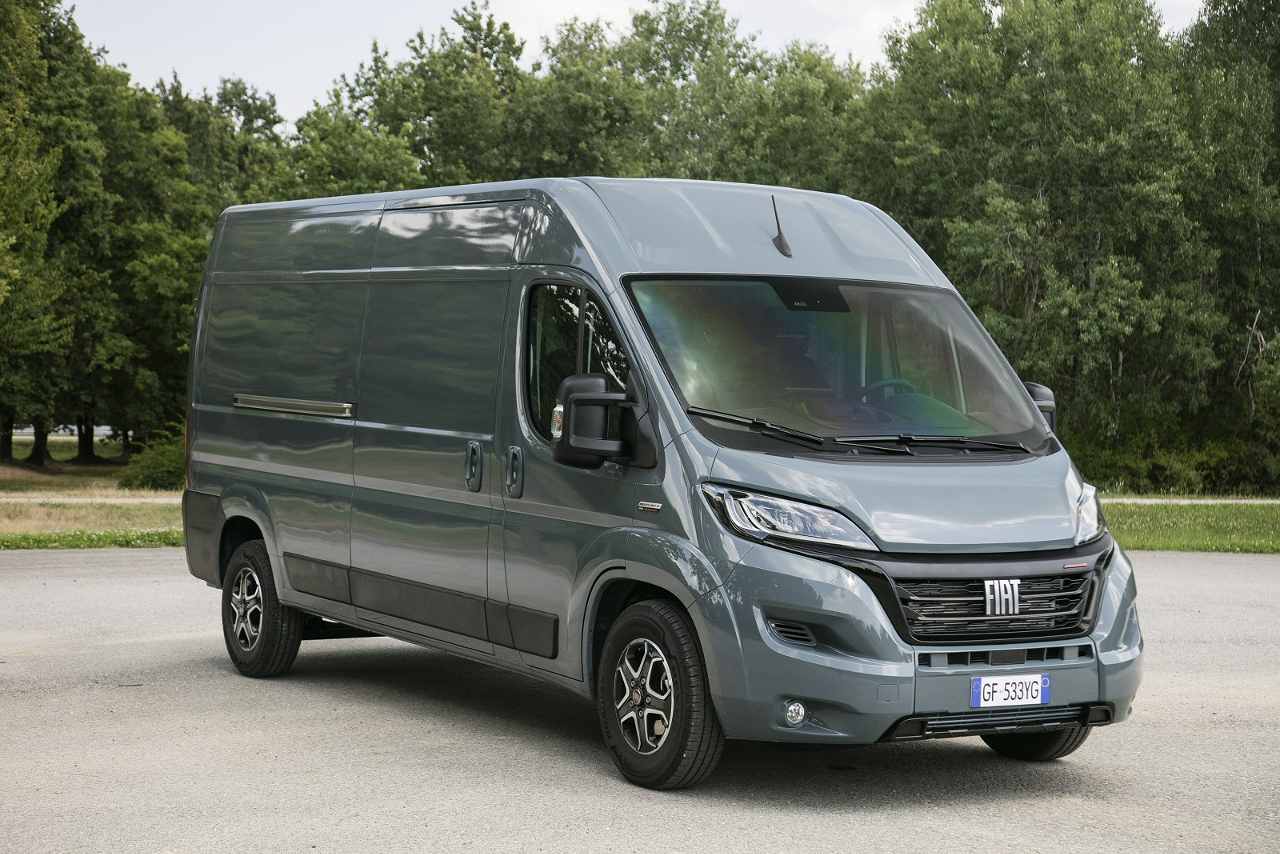By Tom Roberts
Most van manufacturers have an electric medium van on sale, and those who don’t aren’t far away from launching theirs. Let’s face it – medium vans are the mainstay of small businesses and fleets alike, all of whom will at some point in the future have to bite the bullet whether they like it or not and go down the EV route. The Stellantis brands and Mercedes-Benz have had their medium-sized electric vans on sale for some time now. Which is why Vanarama Van Expert Tom Roberts decided to put the Peugeot e-Expert and Mercedes-Benz eVito head to head to see how they compare.
Peugeot launched the Expert in its current guise back in 2016. Quickly shaking off its image as a slightly fusty, old-fashioned van in its previous forms, the current Expert was an instant hit with small businesses in particular. It offers practicality, comfort, a decent level of equipment and an excellent range of engines. Winning multiple industry awards alongside its Vauxhall and Citroen siblings, it wasn’t long before the manufacturer looked ahead to the changing marketplace and introduced the fully-electric e-Expert in 2020.
The current-generation Vito has been around since 2015, a van that for some reason has always fallen short of expectation for the manufacturer, which expects it to compete strongly against the mighty Ford Transit Custom and the Volkswagen Transporter. It’s a mystery to me too, as it is a very competent and good-looking van.
Mercedes-Benz originally marketed an electric Vito back in 2010. The E-Cell was only produced in small numbers as the company dipped its toe into the electric vehicle market, but as there was little interest in EV’s 12 years ago, the project was quietly dropped. The eVito in present form was introduced a couple of years ago as the manufacturer relaunched its attack on the medium electric van market. The first version of the current eVito had only a 90-mile range (or thereabouts), the second version now boasts a larger battery pack and offers closer to 150 miles (ish).
Available Van Body Types
The e-Expert is available in 3 body lengths (Compact, Standard and Long) at the ‘Professional Premium’ trim level, and just the Standard length in combination with ‘Asphalt’ spec. You can also get a Crew Van version with additional passenger space, this also only being offered as a ‘Standard’ length van but in ‘Professional Premium’ trim. Still with me? Good, because I nearly got lost too.
Mercedes-Benz keeps it simple and markets the eVito in 2 lengths, L2 and L3. There’s a choice of 2 trim levels, ‘Professional’ and ‘Premium’, but at present there’s no crew van option.
Motors & Battery Packs
The e-Expert is available with a choice of a 50kWh or 75kWh battery pack. Go for the 75kWh pack and you’ll benefit from an official WLTP Combined range of up to 186 miles before you need to plug in for a recharge. Let’s be realistic, it’s unlikely you’ll achieve this in real world use with many factors affecting range, but it's a great yardstick for comparing van against van.
The 100kW motor produces the equivalent of 136PS and 260Nm or torque, which should be more than adequate for the majority of operators. Onboard, there are 3 selectable driving modes. ‘Eco’ restricts the motors output to 60kW, optimising range. ‘Normal’ ups power to 80kW, offering a balance between performance and economy. Finally, ‘Power’ unleashes the full 100kW.
The eVito’s motor has an output of 85kW, which is equivalent to 114hp, probably sufficient for most users, but there’s a slightly slow start to putting your foot down. Mercedes-Benz came under a fair bit of criticism with the poor range offered by the first generation of eVito, but the new 66kWh battery pack is a huge improvement on the previous 41kWh version and is responsible for the more realistic and practical 162-mile WLTP calculated range between charges. There’s no doubt that this single change in specification makes the eVito worthy of consideration for anyone thinking of leasing a new electric medium van, whereas previously many would have discounted it early on in their research.
The eVito also features a choice of drive modes called ‘Dynamic Select’. You can choose between ‘Comfort’, ‘Efficiency’ and ‘Efficiency plus’. The manufacturer says that these options program appropriate ‘strategies’ (or balance) for heating, ventilation, the drivetrain and other ancillaries.
Charging Times
The e-Expert has a 7.4kW onboard charger fitted as standard, with an option for an 11kW unit should you have access to a more powerful 3-phase wallbox charger. With the standard offering coupled up to a conventional home wallbox rated at 7.4kW, a complete charge should take 7.5 hours. Using a 100kW DC public chargepoint, you’ll be up to 80% of capacity within 30 mins.
As for the eVito, that 7kW wallbox that you might have at home will get you from 0 to 100% of capacity in around 8 hours, and if you’ve opted for the higher output 11kW supply, this will bring the time down to around 6.5 hours. Find yourself an 80kW DC chargepoint and 10% to 80% will take just 35 minutes.
Payloads & Cargo Area Measurements
Perhaps not the most exciting part of a van comparison, but loadspace size and payload can be critical to some medium van users. Load length at floor level for the e-Expert ‘Compact’ is 2162mm, rising to 2512mm for ‘Standard’ and 2862mm in the loadspace of ‘Long’.
eVito has 2461mm of length in the L2 version and 2691mm in the L3. Both vans have optional under-seat space and load-through apertures allowing longer loads to be carried.
Volume is a good yardstick to allow overall loadspace to be compared. The e-Expert has 6.1 cubic metres of capacity in the ‘Long’ version, while eVito has the edge with 6.6cu/m if you opt for the L3 version.
There’s a clear winner in the payload stakes. All models of the Peugeot can carry around 1000kgs and towing capacity is a similar figure. The Mercedes has a carrying capacity of between 824kg and 882kg, but the van is not permitted to tow any trailer.
Trim & Spec Comparison
Peugeot kicks off the range with some decent spec in the entry-level e-Expert ‘Professional Premium’ (this is the mid-range offering for diesel Expert). You get air conditioning, a 7-inch touchscreen with Apple CarPlay and Android Auto smartphone integration, automatic lights and wipers and the ‘Moduwork’ load-through facility with a versatile passenger seat.
‘Asphalt Premium’ adds a rear camera and parking sensors, satellite navigation, a safety pack, which includes lane departure warning system, speed limit recognition and driver attention assist, and on the outside 17-inch alloy wheels are joined by a ‘look pack’, which includes body-coloured bumpers and door handles, together with a chrome grille. You also get metallic paint.
There are also 2 eVito trim levels to choose from, compared to 3 with the diesel van, but Mercedes-Benz has been very generous, particularly with safety tech. All eVito vans come with the likes of Active Brake Assist, Attention Assist, Crosswind Assist and an Acoustic Presence Indicator, making an audible sound at speeds below 19mph to alert pedestrians of its presence.
The ‘Progressive’ model comes with a DAB radio and the Apple Carplay/Android Auto smartphone integration. There’s air conditioning, cruise control, a reverse camera and even a heated driver’s seat. A Thatcham alarm is also fitted as standard - a big plus.
eVito ‘Premium’ adds some nice touches to the exterior, with 17-inch alloy wheels, metallic paint, painted bumpers and a chrome grille. In the cab, not too many changes, but you do get a leather steering wheel, front and rear parking sensors, and electrically-folding door mirrors.
Servicing & Warranty
Peugeot provides 3 years of warranty cover for the e-Expert, with a 100,000-mile cap. The battery is guaranteed to retain at least 70% of its original capacity for 8 years or 100,000 miles. You’ll need to have a service on the van's first birthday (or at 12,500 miles) but after that the interval is every 2 years or 25,000 miles.
A 3-year or 100,000-mile warranty is also standard with all eVito vans, and the battery pack is guaranteed for 8 years or 160,000kms (99,419 miles, to be precise). You’ll need to have the van serviced annually to stick to the manufacturer’s recommendations and keep the warranty intact.
Tom’s Takeaways
In short, which van you choose will depend on what your priorities are. The Peugeot has a more powerful motor, and if you opt for the larger battery pack, it’ll go further between charges. The eVito has the lure of the 3-pointed star badge, which some will find tempting, and although the Mercedes is only offered in 2 body lengths, the L3 does provide a significantly larger loadspace.
The eVito, however, falls short on payload, and the lack of towing ability will make the van a non-starter for some. Both vans have generous levels of specification, but I think the eVito might have the edge on safety and driver aid tech, and the alarm system fitted as standard is a huge tick in its column.
If you’re still undecided, check out our article that ranks the top 10 electric vans by range, then head over to the Vanarama electric van special offer page for the best leasing deals on these 2 very capable medium-sized electric vans.




